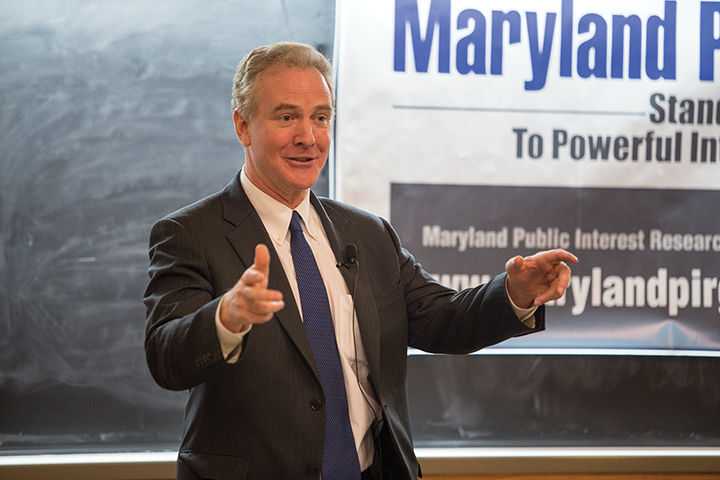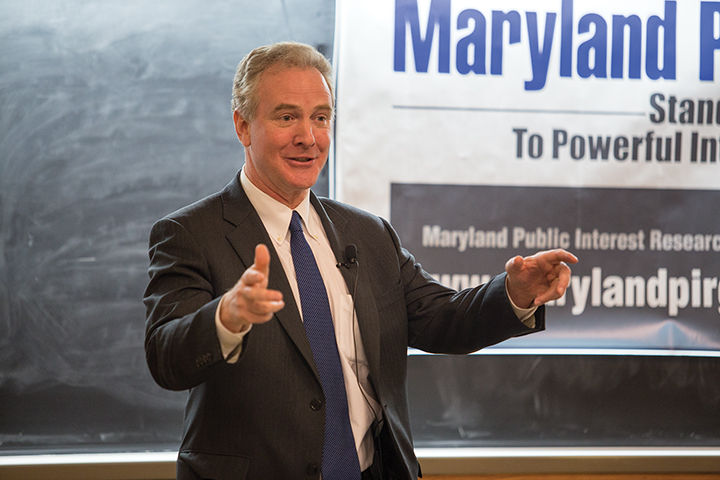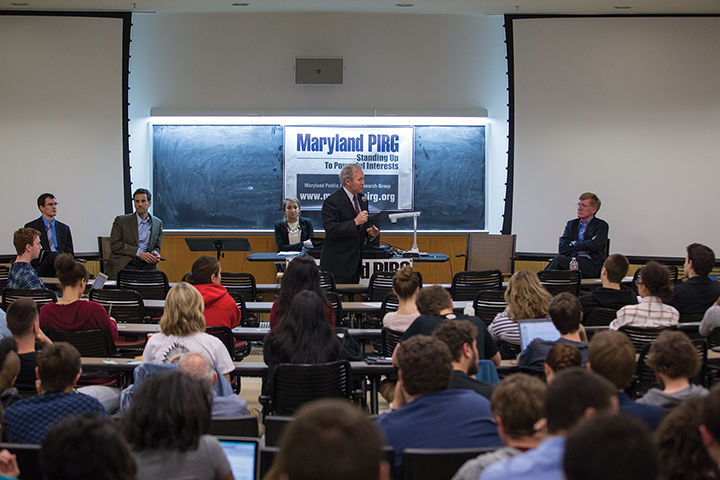U.S. Reps. Chris Van Hollen (D-Md.) and John Sarbanes (D-Md.) discussed campaign financing and the presence of big money in politics in front of a group of about 140 students last night.
“We, of course, pride ourselves in the words that we have a government for the people, of the people, by the people,” said Van Hollen, who has announced his plan to run for U.S. Senate in 2016. “Of course, we meant to spell by ‘B-Y,’ not ‘B-U-Y.’”
The panelists rattled off statistics throughout the event, which was sponsored by this university’s Maryland PIRG chapter, a student-run public interest advocacy organization, in Jimenez Hall. Following the discussion, the audience watched the documentary Pay 2 Play: Democracy’s High Stakes.
“It’s staggering how just a hundred Americans contribute more and finance more of the campaign finance system elections, whether through super PACs or other independent expenditures, than the 4.7 million Americans who contribute under $200 a year,” Van Hollen said.
Only 10 percent of Americans give to political campaigns,and less than 1 percent of Americans fund the majority of political campaigns, said government and politics professor Michael Spivey.
“The great majority of Americans are not participating monetarily in elections,” he said.
Sarbanes said he’s witnessed a rising level of cynicism in politics, especially among young people, which he said stems from problems such as campaign financing. Sarbanes, the author and sponsor of the Government by the People Act of 2014, told the group he will fight the idea that big money in politics cannot change.
The bill, introduced in February 2014, would encourage more Americans to participate in the political process by providing a $25 tax credit for small donations. These donations would be matched with limited public funds, allowing small donors to have a bigger impact on campaigns.
During the Q-and-A portion of the talk, Sarbanes spoke directly to the students about the need to do more.
“This is about power,” Sarbanes said. “I see the power you have that you just don’t own. You just leave it there. There are millions of people in the 18-30 cohort who do not vote on Election Day.”
Freshman Matthew Rogers said the discussion piqued his interest about the issue of campaign financing.
“It really makes me realize the potential empowerment and I would like to see what an avenue such as [campaign finance reform] would have in store for the future of our voting population,” said Rogers, who is enrolled in letters and sciences.
In May, MaryPIRG will hold a lobby meeting with House Minority Whip Steny Hoyer (D-Md.). The organization plans to present him a petition with more than 3,000 signatures from students asking for the Citizens United decision to be overturned, said Andrea Holtermann, a sophomore business major and MaryPIRG democracy campaign co-chair.
“Even if you’re not so inclined to learn about campaign financing, if you are interested in any sort of social issue — in climate change, in environmental change — the first thing you need to change is big money spending and special interests,” Holtermann said.
U.S. Representative Chris Van Hollen (D-Md.) speaks at a MaryPIRG event that featured a screening of the documentary Pay 2 Play: Democracy’s High Stakes on Monday, March 30, 2015.
Phil Andrews, a former Montgomery County Councilmember, speaks as a panelist at a MaryPIRG event that featured a screening of the documentary Pay 2 Play: Democracy’s High Stakes on Monday, March 30, 2015.





